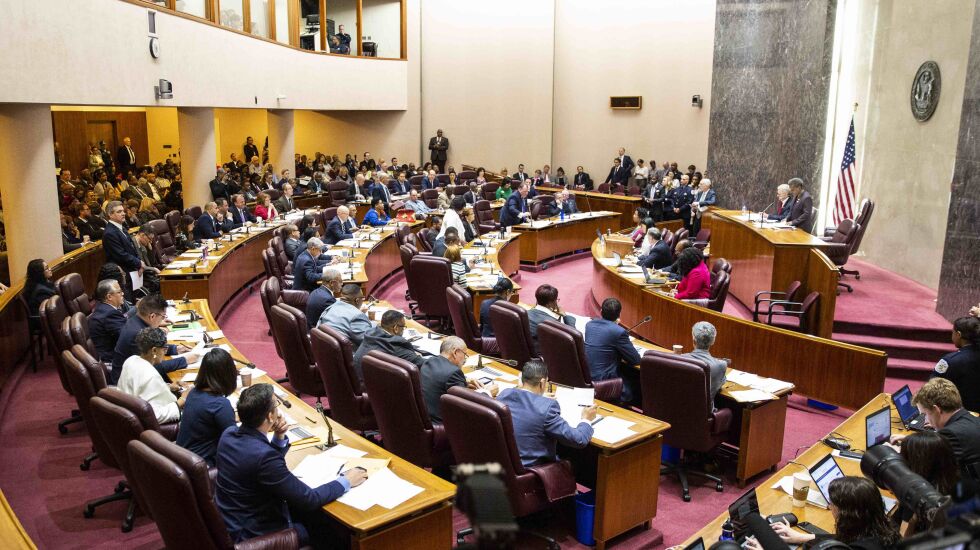
Mayor Lori Lightfoot is being urged to scrap plans for a $42.7 million pre-election property tax increase — half of what an automatic escalator would have allowed — to avoid risking an embarrassing defeat and she’s listening, her City Council allies said Wednesday.
Ald. Jason Ervin (28th), chairman of the Council’s Black Caucus, and License Committee Chair Emma Mitts (37th), are just a few of the mayoral allies who have advised the mayor to find another way.
“I don’t think anybody’s standing up and saying, ‘Hey, sign me up for a tax increase.’ Nobody’s interested in increasing taxes at a time when inflation is up. Plus, we got some unexpected [revenue] sources that came in, with $25 million from the sale of the Skyway,” Ervin said Wednesday.
“We should be able to carve out [the remaining] $17 million. With the way revenues are trending up, we should be able to make that up with just conservative estimates.”
To underscore how difficult it will be for Lightfoot to pass a pre-election property tax increase, Mitts pointed to Lightfoot’s 25% public approval rating and to the unprecedented transition under way in the City Council.
“It’ll be a hard sell. It was hard last time and you didn’t have 15 leaving. And the 15 leaving are all mad at her. Some are running for mayor. Some are saying they can’t get along with her,” Mitts told the Sun-Times.
“If she’s smart, she’ll get rid of the property tax increase and deal with what she has to deal with [financially] next year. Retailers and businesses are hurting. All I keep hearing from people is her numbers are bad in their wards. If you’re running for re-election, why would you vote for a tax increase?”
Three other influential council members, all speaking on condition they remain anonymous, said they believe Lightfoot will respond to the behind-the-scenes lobbying campaign by scrapping the $42.7 million property tax increase altogether, but keeping the automatic escalator for future years.
The mayor’s office released a statement saying Lightfoot is “reviewing all diverse revenue streams to ensure a structural balance while avoiding placing the burden too heavily on any one revenue source.”
“We are evaluating all available options and will make an announcement on Monday,” the statement said.
The escalator automatically increases Chicago’s property tax levy by the rate of inflation or 5%, whichever is less.
With inflation soaring to levels not seen in 40 years, the escalator would have triggered an $85 million property tax increase. In August, however, Lightfoot announced she would cut it in half, thanks to a $127.9 million shortfall for 2023 that she portrayed as the lowest in recent memory.
At the time, Lightfoot said the revised, $42.7 million increase would be earmarked exclusively for pension payments. She tried to sell it by claiming it would cost the owner of a home valued at $250,000 just $34 more each year.
“That’s about the price of an Al’s Italian beef — hot, dipped, with extra cheese — for a family of four,” the mayor said.
“Nobody wants to pay taxes. But [if] the choice is non-delivery of city resources, layoffs of city workers or a modest tax increase, most people would say, ‘OK, Mayor. I get that. I may not like it. But I get it.’”
Lightfoot said then she anticipated pushback from the same council members who opposed the automatic escalator the first time around. But she argued the annual trigger makes sense because it gives home and business owners the “predictability” they crave.
“For years, mayors in this town wouldn’t make the tough decisions around funding pensions properly, so pensions became grossly underfunded. We’d skip property tax increases every single year. And then, suddenly, year after year, you’d have the highest property tax increase in the history of the city. That benefited no one. And it certainly didn’t benefit members of the City Council who had to take those tough votes,” she said.
“It’s easy in an election year to say, ‘Let’s do nothing.’ But our pension obligation continues to grow year after year. So if we do nothing, be sure, taxpayers, they’re coming back for you later.”
Last year, Lightfoot’s $16.7 billion budget sailed through the Council on a 35-15 vote, thanks to an avalanche of federal relief funds paving the way for an unprecedented 30% increase in city spending.
The vote to raise Chicago’s property tax levy by $76.5 million was 32 to 18.
The year before was an even closer shave, as the council voted 28-22 to approve Lightfoot’s plan to raise property taxes by $94 million, followed by annual increases tied to the consumer price index.







